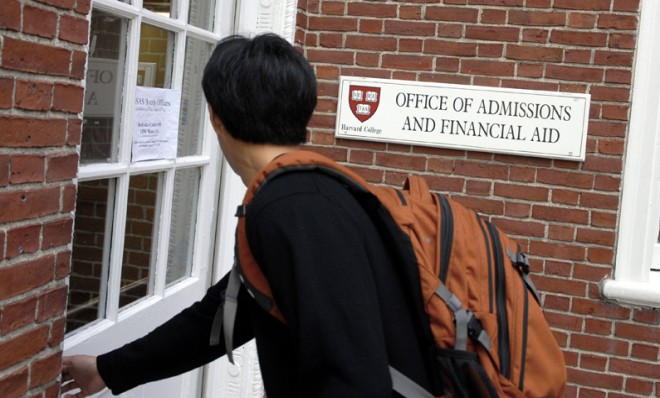Is 'being yourself' enough to get into college?
One scorned high schooler blasts the admissions process for false advertising

A free daily email with the biggest news stories of the day – and the best features from TheWeek.com
You are now subscribed
Your newsletter sign-up was successful
With every April comes a fresh batch of disappointed high school seniors scorned by the increasingly competitive college admissions process. Some take this in quiet stride. Others take to the pages of a major national publication.
Pittsburgh high school senior Suzy Lee Weiss has written an op-ed in the Wall Street Journal lashing out at the colleges that rejected her. Though she admits she is suffering from "sour grapes," she feels it is necessary to call out colleges for not being more honest about their acceptance criteria. Their crime? Telling applicants to "just be yourself."
This advice only works, Weiss writes, when you have "nine extracurriculars, six leadership positions, three varsity sports, killer SAT scores, and two moms." She adds that she "would have gladly worn a headdress to school" and come out of the closet for the sake of fulfilling colleges' goal of "Diversity!" She also writes that she wishes she had mimicked some of her savvier peers who created a fake charity to become more appealing applicants. "As long as you're using someone else's misfortunes to try to propel yourself into the Ivy League," she writes, "you're golden."
The Week
Escape your echo chamber. Get the facts behind the news, plus analysis from multiple perspectives.

Sign up for The Week's Free Newsletters
From our morning news briefing to a weekly Good News Newsletter, get the best of The Week delivered directly to your inbox.
From our morning news briefing to a weekly Good News Newsletter, get the best of The Week delivered directly to your inbox.
"This piece is a good old fashioned spiteful rant," writes Caity Weaver at Gawker. But why did she accept the "be yourself" mantra literally? "Being yourself is not a talent," writes Weaver. "If you worked two full-time jobs all the way through high school and one of them was 'being yourself' and the other was 'trying your best,' you actually worked zero jobs." Weaver points out that Weiss' complaint about needing "killer SAT scores" is actually "a very reasonable requirement for college admission." Even more galling is that Weiss' lesson from the "failed 'que sera sera' method of college admission" is not to work harder or become more involved in extracurriculars. Rather, Weiss' message is that "'it is unfairly easy for minorities and gay people and Ke$ha to "be themselves" on their way into college.'"
What's especially odd in a rant against the college admissions process is a failure to criticize the preference given to legacy applicants. However, that might be a purposeful move not to bring attention to her own privileged connections. "Perhaps," writes Weaver, "her sister, Bari Weiss, former Wall Street Journal editorial features editor, talked her out of it."
Others argue that Weiss' piece should not be taken literally (as Weiss herself has since said), but read for its sharp critique of how subjective and unpredictable the college process has become. "Weiss' critics don't seem to understand her point," writes Christine Powell at Newsday. "She's not arguing that lazy teenagers who barely scrape by or show little potential should be handed to Ivy Leagues." Critiquing the "just be yourself" advice is more than fair, as is "bemoaning the admissions process as misleading and skewed," says Powell. Weiss is highlighting that college admission "has become a game," writes Powell. "It's overly selective and seemingly random. For the mass of students who do well and take leadership applying to tough schools, there's little rhyme or reason to their acceptances and rejections."
It's not so much that college admissions have become a game, as that cynicism has seeped into the whole process, writes Alexandra Petri at The Washington Post. The way the admissions process currently works encourages students to approach learning, volunteering, and various other positive activities solely as a means to gain acceptance to an elite university. "There's a difference between living right on the hopes of getting into Paradise and living right because you believe it's the right thing to do," writes Petri. "And these days it's impossible to tell." As a result, says Petri, by the time kids arrive at these great universities, "everyone stares blankly and says, 'What's my motivation? I'm already IN college.'" Weiss' essay raises the question: Is it "more dangerous to be rewarded or punished for what you did in high school?"
A free daily email with the biggest news stories of the day – and the best features from TheWeek.com
Emily Shire is chief researcher for The Week magazine. She has written about pop culture, religion, and women and gender issues at publications including Slate, The Forward, and Jewcy.
-
 Why are election experts taking Trump’s midterm threats seriously?
Why are election experts taking Trump’s midterm threats seriously?IN THE SPOTLIGHT As the president muses about polling place deployments and a centralized electoral system aimed at one-party control, lawmakers are taking this administration at its word
-
 ‘Restaurateurs have become millionaires’
‘Restaurateurs have become millionaires’Instant Opinion Opinion, comment and editorials of the day
-
 Earth is rapidly approaching a ‘hothouse’ trajectory of warming
Earth is rapidly approaching a ‘hothouse’ trajectory of warmingThe explainer It may become impossible to fix